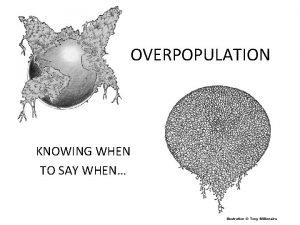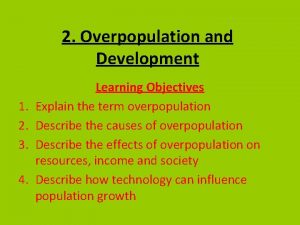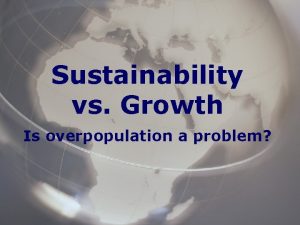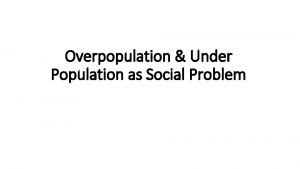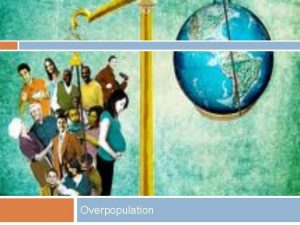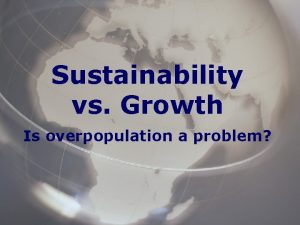Consequences of overpopulation Laurence Knight Introduction to overpopulation







- Slides: 7

Consequences of overpopulation Laurence Knight

Introduction to overpopulation • The birth rate of a country far exceeds the death rate, resulting in a rapidly rising population • Especially evident in India and China with both countries having populations of over 1 billion • This inevitably causes pressure on finite natural resources such as fuel, water and food as the demand of resources outweighs the supply. Exponential growth since the 18 th century

Pressures on water • Among all natural resources, water is the most important and essential for humans to survive. • ‘overpopulation, consumption, overuse, wastage and misuse of resources have strained the earths carrying capacity’ (R Pratap et. al, 2016) – the earths water sources can no longer supply every person with water sustainably • An increased population would also lead to increased pollution, affecting the water cycle and potentially polluting main water sources.

Pressure on food • Along with water the demand for food will also increase hugely • There has been an increase in numbers of undernourished people in the world, 832 million in 1995 versus 923 million in 2007, all of which has come about due to overpopulation (United nations, 2000) • the availability of world grain, which make up 80 per cent of the world's food, has been declining for the past 15 years • With 250, 000 people being added to the population every day, the demand for food will reach unprecedented levels (D Pimentel, 1996)

Pressure on the environment • According to the Global Footprint Network, "today humanity uses the equivalent of 1. 5 planets to provide the resources we use and absorb our waste“ - massively unsustainable • According to Worldwide Institute, if China and India were to consume as much resources per capita as the United States, in 2030 they would each require a full planet Earth to meet their needs (Worldwatch Institute, 2006) • In the long term these effects can lead to increased conflict over dwindling resources

Pressure on oil/fuel sources • Like all other finite resources, as population rises the oil and fossil fuel sources around the world will decrease – more cars, industry etc. • The price of oil is already high, however it will rise significantly more as demand increases and supply lower • This is a result of overconsumption in the developed countries and overpopulation in the developing countries (Korbitz, 1999).

References • Singh, R. , 2016. Environmental Issues Surrounding Human Overpopulation. 1 st ed. India: IGI Global. • Food and Agriculture Organization Economic and Social Development Department. "The State of Food Insecurity in the World, 2008 : High food prices and food security – threats and opportunities" Archived 26 October 2016 at the Wayback Machine. . Food and Agriculture Organization of the United Nations, 2008, p. 2. • Pimentel, D. , 1996. Impact of Population Growth on Food Supplies and Environment. 1 st ed. New York: Population and Development Review. • "State of the World 2006: China and India Hold World in Balance Archived 15 April 2016 at the Wayback Machine. ". Worldwatch Institute. 11 January 2006. • Korbitz, W. , 1999. Biodiesel production in Europe and North America, an encouraging prospect. 1 st ed. USA: Renew Energy.

